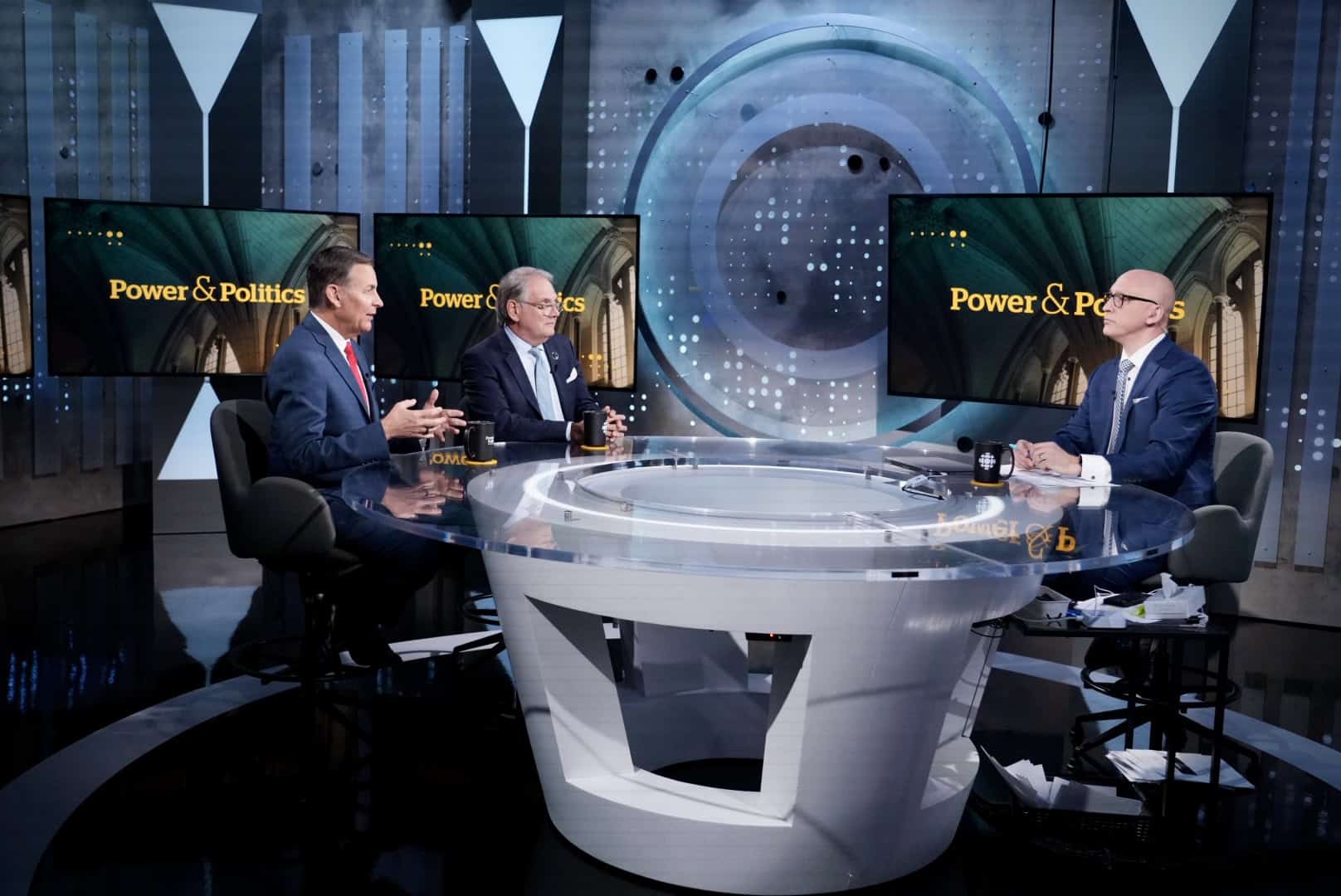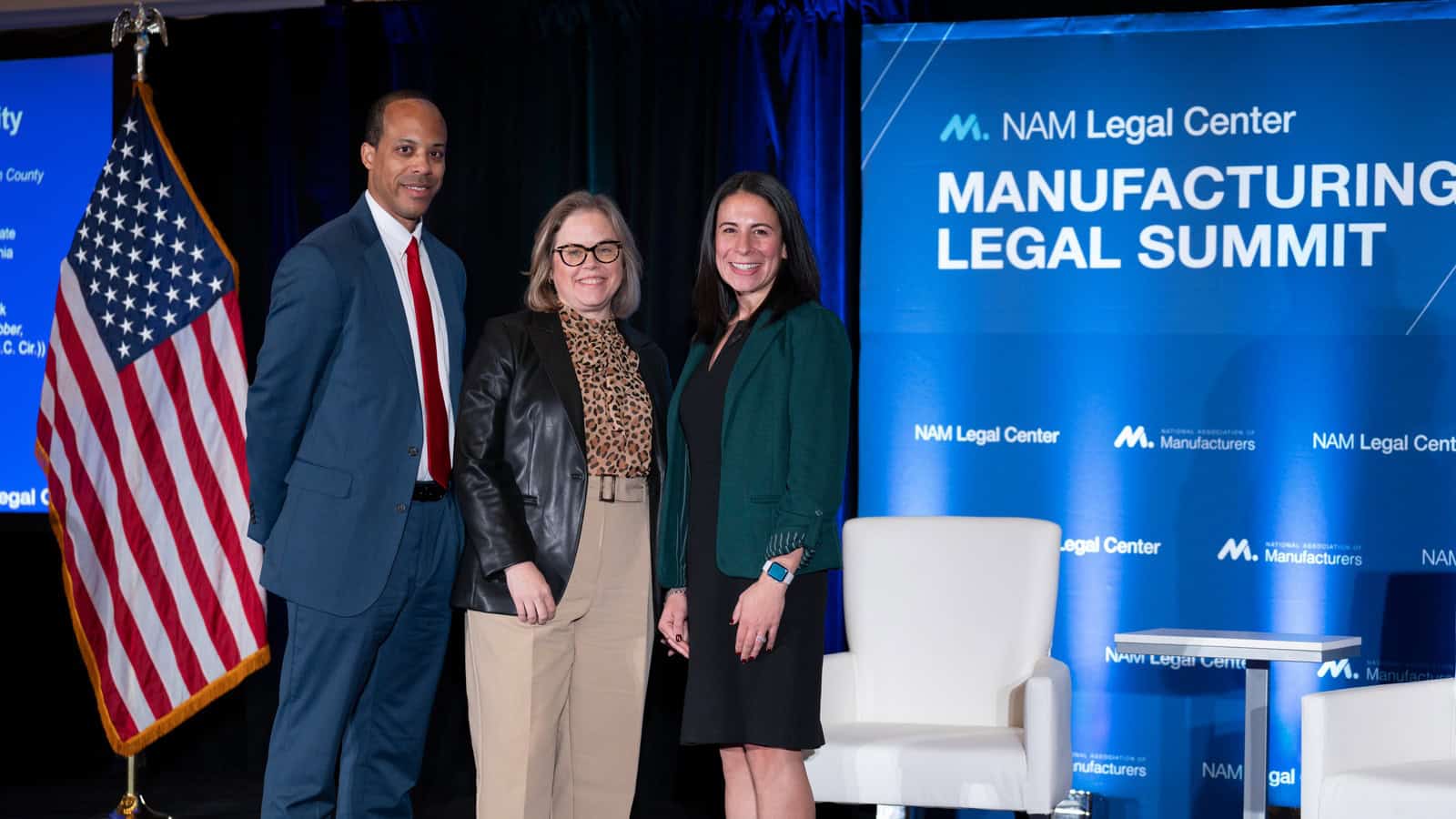Manufacturers Appreciate President Trump’s Focus on Curbing the Regulatory Onslaught
Washington, D.C. – Today, the National Association of Manufacturers, along with more than 100 manufacturing associations, sent a letter to President Donald Trump laying out a roadmap for regulatory actions across a wide range of agencies that would boost the manufacturing economy and put a stop to the regulatory onslaught that is costing manufacturers $350 billion each year.
Manufacturers have made the case that unbalanced, unworkable regulations severely impact our ability to grow and create jobs. Today’s letter lays out specific steps the new administration can take to reverse the trend of federal agency overreach—providing much-needed regulatory certainty to manufacturers and empowering the industry to continue to make the long-term investments that drive job creation, growth and economic competitiveness here in the United States.
The letter states, in part:
Dear President-elect Trump,
Right now, regulations are strangling our economy. Manufacturers are shouldering enormous regulatory compliance costs—nearly $350 billion annually, or 12% of our entire sector’s contribution to U.S. GDP. For smaller manufacturers with fewer than 50 employees, these costs can exceed $50,000 per employee each year. This means that a small manufacturer with just 20 employees pays $1 million per year to comply with federal regulations—rather than investing those funds in raises or new jobs.
The regulatory onslaught reached a fever pitch during the Biden administration. Prior to the election, the National Association of Manufacturers surveyed the industry and found a significant decline in optimism among manufacturers, with an unfavorable business climate, particularly taxes and regulations, cited as a primary business challenge by more than 60% of respondents.
You have the opportunity to tackle this challenge by addressing burdensome regulations that are stifling investment, making us less competitive in the world, limiting innovation and threatening the very jobs we are all working to create right here in America.
The letter highlights more than three dozen regulatory actions the Trump administration can take to support manufacturing growth, including the following:
- Liquefied Natural Gas Export Ban: On Day One of your administration, lift the pause on LNG exports through an updated national interest assessment.
- Permitting Reform: Appoint an official within your administration to help coordinate policies across the executive branch to ease the permitting burden. Specifically, your administration should start by prioritizing a reconsideration of the “NEPA Phase 2 Rule” and the current implementation of the permitting reform provisions of the Fiscal Responsibility Act.
- National Ambient Air Quality Standards for Particulate Matter and Ozone: Reconsider and relax the Biden administration’s NAAQS for PM2.5 rule and maintain both the primary and secondary standard for the NAAQS for ozone rule at 70 parts per billion.
- Power Plant Rules: Replace the Environmental Protection Agency’s rule for existing coal-fired and new natural gas–fired power plants with workable standards.
- Proxy Advisory Firms and the Proxy Process: Rescind Staff Legal Bulletin 14L and end the politicization of the proxy process. Additionally, enforce and preserve the 2020 proxy advisory firm rule while taking steps to build on its reforms with additional policies modeled on the Securities and Exchange Commission’s 2019 proposal.
To view the full letter and list of regulations, click here.
Background:
In 2023, the NAM, along with members of the NAM’s Council of Manufacturing Associations and Conference of State Manufacturers Associations, launched the Manufacturers for Sensible Regulations coalition to address the impact of the regulatory onslaught coming from federal agencies.
An NAM-commissioned analysis on the cost of federal regulations to the U.S. economy shows the following:
- The total cost of federal regulations exceeds $3 trillion each year, an amount equal to 11% of U.S. GDP.
- Federal regulations cost the manufacturing sector about $350 billion per year.
- Small manufacturers with fewer than 50 employees face disproportionate regulatory burdens, incurring costs of more than $50,000 per employee per year to comply with federal regulations.
- Since 2012, there has been a $465 billion increase in aggregate regulatory compliance costs.
-NAM-
The National Association of Manufacturers is the largest manufacturing association in the United States, representing small and large manufacturers in every industrial sector and in all 50 states. Manufacturing employs nearly 13 million men and women, contributes $2.91 trillion to the U.S. economy annually and accounts for 53% of private-sector research and development. The NAM is the powerful voice of the manufacturing community and the leading advocate for a policy agenda that helps manufacturers compete in the global economy and create jobs across the United States. For more information about the NAM or to follow us on Twitter and Facebook, please visit www.nam.org.
NAM Backs Bipartisan Calls for PBM Reform During Lame Duck
Congress Must Act Immediately to Rein in PBMs
Washington, D.C. – Today, the National Association of Manufacturers voiced manufacturers’ support for efforts led by Rep. Buddy Carter (R-GA) to bring much-needed reform and transparency to pharmacy benefit managers. The NAM is a champion for PBM reform given that these underregulated middlemen drive up health care costs for manufacturers and manufacturing workers.
Following a press conference hosted by Rep. Carter to announce a bipartisan effort with dozens of members of Congress to push for PBM reform in the lame-duck session of Congress, NAM Managing Vice President of Policy Chris Netram released the following statement:
“Manufacturers and manufacturing workers are facing increasing and unsustainable health care costs as a direct result of PBMs. Manufacturers agree with Rep. Carter and the bipartisan, bicameral members of Congress calling for reform: Congress must act urgently—in the lame-duck session—to increase transparency, lower health care costs and protect manufacturing workers.”
Background: Last month, the NAM launched a seven-figure video and digital advertising campaign urging Congress to pass PBM reform legislation this year.
The NAM’s Q3 2024 Manufacturers’ Outlook Survey found that 78% of small manufacturers with fewer than 50 employees cite rising health care costs as a primary business challenge—the top concern among small business respondents in the survey.
To view the NAM’s latest digital ad, click here.
-NAM-
The National Association of Manufacturers is the largest manufacturing association in the United States, representing small and large manufacturers in every industrial sector and in all 50 states. Manufacturing employs nearly 13 million men and women, contributes $2.91 trillion to the U.S. economy annually and accounts for 53% of private-sector research and development. The NAM is the powerful voice of the manufacturing community and the leading advocate for a policy agenda that helps manufacturers compete in the global economy and create jobs across the United States. For more information about the NAM or to follow us on Twitter and Facebook, please visit www.nam.org
NAM: D.C. Circuit Should Preserve SEC Oversight of Proxy Firms

The U.S. Court of Appeals for the D.C. Circuit should overturn a lower court’s ruling that the Securities and Exchange Commission lacks the authority to regulate proxy advisory firms, the NAM said in a recently filed brief.
What’s going on: The Nov. 15 brief asking the appeals court to overturn a February ruling by the D.C. District Court is the latest in a years-long campaign by the NAM to ensure reasonable regulation of proxy firms. These powerful, unregulated entities often dictate how shareholders vote on proxy ballot proposals that come before public companies.
- “Since the passage of the Securities Exchange Act of 1934 in the wake of the Great Depression, the Securities and Exchange Commission has regulated proxy solicitation, so shareholders can confidently vote based on transparent and reliable information,” according to the NAM brief. “Accordingly, since the proxy voting advice industry emerged four decades ago, those firms have been subject to SEC regulation.”
- Institutional Shareholder Services, the largest and most influential proxy firm, “would rather not be regulated at all”—but “[t]he record overwhelmingly establishes that proxy firms ‘solicit’ proxies under any reasonable definition,” subjecting them to SEC oversight as required by the Exchange Act.
Why it’s important: Proxy firms wield enormous influence over both manufacturers and Main Street investors, the NAM said.
- “ISS and its main competitor, Glass Lewis, control 97% of the proxy advice market and together influence nearly 40% of the U.S. shareholder vote,” the NAM told the court in its brief.
- Further, proxy firms operate with undisclosed conflicts of interest, their reports can contain errors and misleading statements and their “robo-voting” services give them the authority to cast investors’ proxy votes with no review or input by the investors themselves.
NAM on the front lines: In July 2020, after years of NAM advocacy, the SEC finalized a rule instituting critical proxy firm reforms. ISS quickly brought a legal challenge, and the NAM intervened in the case to ensure a robust defense of the rule.
- Following the change in presidential administrations in 2021, in separate lawsuits the NAM successfully challenged the Biden SEC’s refusal to enforce the 2020 rule and its rescission of critical portions of the rule.
- After an unfavorable decision from the D.C. district court in the ISS challenge, the Biden SEC declined to pursue an appeal, effectively disclaiming its authority to regulate proxy firms. The NAM took the lead as intervenor-appellant in the case, so manufacturers are now the sole bulwark against proxy firms’ unchecked power. A victory in the D.C. Circuit for the NAM would make the proxy firms subject to the 2020 rule’s important reforms.
Former SEC officials agree: A group of former SEC commissioners and staff authored an amicus brief in support of the NAM’s position.
- The brief chronicles the commission’s 50-year history of affirming that proxy firms are engaged in solicitation. The officials make clear that “stripping the SEC of its long-standing and Congressionally conferred power to regulate the firms” would “seriously harm the investing public by decreasing fairness and honesty in the markets—exactly the opposite of what Congress was trying to accomplish in the Exchange Act.”
What’s next: ISS’s response to the NAM’s brief is due in the coming weeks, and the court likely will schedule oral argument for early 2025.
Manufacturers Ready to Work with Bessent to Ensure That We Can Continue to Drive Economy Forward
Washington, D.C. – National Association of Manufacturers President and CEO Jay Timmons issued the following statement on the nomination of Scott Bessent to be the next Treasury Secretary:
“President Trump’s 2017 tax reforms were rocket fuel for manufacturing, and their transformative impact cannot be overstated. They put into place competitive policies that fueled record job creation, wage growth, capital investment and innovation.
“With the nomination of Scott Bessent as Secretary of the Treasury, we have an opportunity to build on this momentum. President Trump recently pledged at the NAM’s fall board meeting that he will make these tax cuts permanent, and Scott will play a vital role in achieving that goal.
“Scott’s deep expertise in financial markets and his dedication to fostering economic growth make him an outstanding choice to lead the Treasury Department. Manufacturers are ready to work with him to ensure that manufacturing can continue to drive the economy forward.”
-NAM-
The National Association of Manufacturers is the largest manufacturing association in the United States, representing small and large manufacturers in every industrial sector and in all 50 states. Manufacturing employs nearly 13 million men and women, contributes $2.91 trillion to the U.S. economy annually and accounts for 53% of private-sector research and development. The NAM is the powerful voice of the manufacturing community and the leading advocate for a policy agenda that helps manufacturers compete in the global economy and create jobs across the United States. For more information about the NAM or to follow us on Twitter and Facebook, please visit www.nam.org.
Timmons: USMCA, Right Policies Can Bring “Manufacturing Revival”

The North American trade landscape will look different once President-elect Trump takes office, NAM President and CEO Jay Timmons said this week—but “the special relationship” between the U.S. and Canada will only grow stronger.
What’s going on: “President Trump has been very clear about his priorities, his commitments,” Timmons said Wednesday in Ottawa on CBC News’ “Power & Politics,” where he was joined by Canadian Manufacturers & Exporters President and CEO Dennis Darby. Timmons was in Canada for this year’s North American Manufacturing Conference, hosted primarily by the CME.
- “[E]veryone in the business community and in adjoining governments need to be approaching the administration change with very clear eyes [because] … what Donald Trump says, Donald Trump means. Now, having said that, Donald Trump wants to see manufacturing in the United States grow and thrive.”
- Part of that prosperity will be continuing and strengthening United States–Mexico–Canada Agreement, which “has demonstrated that the regional economic activity that has been generated has been beneficial for all three countries,” Timmons continued.
On Mexico: “[W]e all should be concerned if the letter and the spirit of the agreement [of USMCA] are not being followed,” Timmons told “Power & Politics” host David Cochrane. While Mexican President Sheinbaum “has indicated that she wants to make sure that the agreement is ratified for the future,” the proposed constitutional amendments “have … [been] problematic for the United States.”
- Mexico has also had “some issues with takings of private property of American manufacturers,” Timmons added. “Those things can’t stand, so those are issues that will have to be addressed as the [USMCA] review process occurs in 2026, but hopefully the new administration in Mexico will address those things before then.”
Tariffs: Any tariffs imposed by the incoming Trump administration should be calibrated, said Timmons, whose visit to Canada also included meetings with Canadian Labour Minister Steven MacKinnon and Energy and Natural Resources Minister Jonathan Wilkinson.
- Tariffs should address “who’s causing the disruption, who’s causing the problem [and] … the policy that is causing the issue,” Timmons said. “And you need to really go right after that. Otherwise, [tariffs] are not going to be effective.”
“A manufacturing revival”: A respected, fully upheld USMCA is just one piece of the foundation that will usher in a new age of North American manufacturing, Timmons concluded.
- “[S]trengthening the manufacturing sector in the United States … [is] not just about trade,” he said. “In order to attract investment in the United States, we have to have the right tax policy, the right regulatory policies, the right workforce policies, the right energy policies, and the president-elect seems to be focused on all of those areas as well.”
- “So I feel pretty good about a manufacturing a continued manufacturing revival and renaissance in the United States. I think that’s good for the whole region.”
NAM: Clarify 30C Tax Credit Rulemaking

The “30C” tax credit has the potential to spur manufacturing investment, but the Internal Revenue Service and Treasury Department must first clarify some of their proposed rules regarding it, the NAM said this week.
What’s going on: In September, the IRS and Treasury Department jointly proposed regulations regarding Section 30C of the U.S. tax code’s Alternative Fuel Vehicle Refueling Property Tax Credit, which was changed and expanded by the Inflation Reduction Act of 2022.
- “A key purpose of the energy provisions of the IRA was to reduce greenhouse gas emissions and spur manufacturing investments in low emissions and renewable energy sectors,” NAM Vice President of Domestic Policy Chris Phalen told the IRS on Monday.
- “Manufacturers make vehicles that use alternative fueling stations, many of our members produce the components … that go into these stations and manufacturers will construct and operate these refueling properties. These companies require certainty and specificity to make final investment decisions.”
What must be done: To that end, the NAM told the agencies the following changes should be made to the proposed regulations for the 30C tax credit:
- Extend the allowed transition period for organizations to update “census tract designations to reflect population data in the years 2016–2020,” as the draft rulemaking mandates that those wishing to take advantage of the 30C credit “must place the property into service within a specific census tract designation.”
- Clarify whether the location of the refueling infrastructure “would need to be made available to the public to qualify for the 30C tax credit.”
- Provide tax credit “eligibility for certain property directly attributable to the operation of alternative fuel vehicle refueling property, such as electrical panels and conduit/wiring, and ask that the agency also consider related construction and other project costs for eligibility.”
Preserve Tax Reform’s Pro-Growth International Tax System

The international tax system put in place by 2017 tax reform bolsters American competitiveness and supports manufacturing in the U.S.—and that’s why its provisions must be preserved, according to a new policy explainer, part of the NAM’s Manufacturing Wins campaign.
The background: Before passage of the Tax Cuts and Jobs Act, the U.S. tax code made it more costly and less efficient to invest in the U.S. Corporate profits were taxed at the 35% corporate income tax rate when repatriated to the U.S., forcing businesses to keep revenues abroad.
- Tax reform instituted a new, pro-growth international tax regime that incentivizes companies to locate their operations, intellectual property and profits here in the U.S.
The specifics: Tax reform’s international tax provisions include the following:
- A 21% corporate tax rate: Tax reform reduced the corporate rate from 35% to 21%, making “the U.S. a more attractive home for manufacturing investment.”
- The Foreign-Derived Intangible Income deduction: This deduction “reduces taxes for companies that locate job-creating, export-producing intellectual property in the U.S.”
- The Global Intangible Low-Taxed Income regime: The GILTI regime imposes a U.S. minimum tax on income earned abroad in low-tax jurisdictions.
- The Base Erosion and Anti-Abuse Tax: The BEAT applies to certain payments that shift companies’ profits abroad.
Why it’s important: Globally engaged manufacturers face the possibility of significant tax increases at the end of 2025 as key international tax provisions are scheduled to change.
- The FDII deduction will decrease, while the effective GILTI and BEAT tax rates will both increase—upsetting the balance inherent in the TCJA international tax structure and thus making it more costly and difficult for globally engaged companies to operate here in the U.S.
What’s next: In addition to maintaining or reducing the 21% corporate tax rate, the NAM is calling on Congress to prevent the FDII decrease and the GILTI and BEAT tax increases on manufacturers whose success bolsters America’s competitiveness on the world stage.
The last word: “Congress must sustain tax reform’s international tax system, including the lower corporate tax rate, in order to enhance America’s competitiveness and support manufacturers’ efforts to create jobs and grow investment here in the United States,” said NAM Vice President of Domestic Policy Charles Crain.
NAM Hosts 2024 Manufacturing Legal Summit

Manufacturers operate in a world of complex legal and regulatory challenges. In the wake of a national election, with a new administration and Congress on the horizon, those challenges are amplified, as in-house counsel must navigate a rapidly evolving compliance landscape.
The NAM’s third-annual Manufacturing Legal Summit, held Nov. 12–13 at the Willard InterContinental in Washington, D.C., helped in-house counsel at manufacturing companies map the road ahead. The event brought together nearly 150 such leaders from across the United States to share information and best practices.
The goal: “This is the only legal conference geared specifically for manufacturing lawyers,” said NAM Deputy General Counsel for Litigation Erica Klenicki. “What we hear consistently is that the opportunity to connect with others in the industry who are dealing with the same challenges is invaluable. Especially on the brink of a new administration and regulatory environment, we were able to provide connection and content that attendees found particularly helpful.”
The program: The Legal Summit covered a range of topics, including the following:
- Antitrust: A team of experts from Freshfields, including former FTC Commissioner Christine Wilson, joined with Saint-Gobain North America Senior Vice President, General Counsel & Secretary La-Toya Hackney to offer a candid deep dive into enforcement trends from the Biden FTC and what to expect from the new administration.
- Supply chain and ESG: Experts from Foley & Lardner joined Pelican Products Corporate Import/Export Compliance Manager Susan Cass to discuss the growing requirements surrounding supply chain transparency and integrity and best compliance practices for multinational companies.
- PFAS: Industry leaders from Greenberg Traurig provided a comprehensive overview of per- and polyfluoroalkyl substances, including the changing definition of PFAS, the regulatory landscape and how environmental marketing impacts risk, corporate strategy and consumer trust.
- Junk science: This product liability session offered strategies for combating junk scientific theories used to wage high-stakes litigation. It was led by experts from Shook, Hardy & Bacon, as well as Kimberly-Clark Corporation Associate General Counsel Kelly Vickers and Johnson & Johnson Assistant General Counsel Aviva Wein.
- NLRB: Experts from Fisher Phillips recapped the Biden Board’s sweeping changes to labor law and offered predictions on which changes will remain when the new administration takes the helm.
- Election debrief: NAM Managing Vice President of Government Relations Stef Webb offered attendees clarity and context on the 2024 general election, including the political outlook for manufacturers in a Republican-controlled Congress and White House.
- Regulatory law: Panelists from Kennametal, Saint-Gobain and U.S. Steel joined moderator Brendan Collins of Ballard Spahr to talk about recent landmark changes to administrative law and the impact of those decisions on their companies’ approaches to compliance and enforcement.
- AI: Counsel Eran Kahana from Maslon LLP led a thought-provoking discussion on the intersection of generative AI and legal ethics, including the due diligence obligations of in-house counsel as firms adopt this evolving technology.
The reaction: Participants spoke highly of the content and the opportunity for relationship building:
- “This was my first NAM Legal Summit, and I could not be more pleased with the topics presented, as well as the networking opportunities,” said Erin Tannock, compliance counsel for Viega LLC. “The content was relevant and current. I even had a few ‘aha’ moments! This event is worth the time, and I will be attending for years to come.”
Guide to the 119th Congress
On Nov. 5th, President-elect Donald Trump secured enough electoral college votes to become the 47th President of the United States. Republicans also flipped four Senate seats, meaning they will have a 53-47 majority entering the 119th Congress, and maintained control of the House though a small number of congressional races remain outstanding. For the first time since 2016, Republicans will have unified control of both Congress and the White House once President-elect Trump is sworn in on Jan. 20, 2025.
For now, as we enter the “lame duck” session of the 118th Congress, there remains a substantial laundry list of items for members to address before adjourning this session. Both the House and Senate return this week for the first time since the October break.
119th Congress Leadership Elections
Upon having control of both chambers next Congress, House and Senate Republicans returned to Washington this week to elect their respective leadership teams and establish their rules packages for the 119th Congress.
House Republican Leadership
- Speaker of the House – Mike Johnson (R-LA)
- House Majority Leader – Steve Scalise (R-LA)
- House Majority Whip – Tom Emmer (R-MN)
- House Republican Conference Chair – Lisa McClain (R-MI)
Rep. McClain is replacing Elise Stefanik (R-NY) who has been nominated as Ambassador to the United Nations by President-elect Trump.
Senate Republican Leadership
- Senate Majority Leader – John Thune (R-SD)
Sen. Thune will be taking over as GOP Leader from Mitch McConnell (R-KY), who is stepping down after a record 18 years in the position. - Senate Majority Whip – John Barrasso (R-WY)
- Conference Chair – Tom Cotton (R-AR)
- Policy Chair – Shelley Moore Capito (R-WV)
House Democratic Leadership
House Democrats have scheduled their leadership elections for Nov. 19th. It is unlikely there are major changes for the current leadership roster.
- House Minority Leader – Hakeem Jeffries (D-NY)
- House Minority Whip – Katherine Clark (D-MA)
- House Democratic Caucus Chairman – Pete Aguilar (D-CA)
Senate Democratic Leadership
Senate Democrats have not currently scheduled their leadership elections, but it is unlikely the top two positions change. There will be an opening for the third ranking position with Senator Debbie Stabenow (D-MI) retiring.
- Minority Leader – Chuck Schumer (D-NY)
- Minority Whip – Dick Durbin (D-IL)
- Chair of Policy and Communications Committee – To be determined
Debbie Stabenow (D-MI) is retiring from Congress. Amy Klobuchar (D-MN) and Cory Booker (D-NJ) have signaled their interest in this position.
Lame Duck Legislative Outlook
Congress has roughly five legislative session weeks before the Christmas break and several policy items to address in that time. Upon returning to Washington, policymakers face two must-pass pieces of legislation: the FY 2025 National Defense Authorization Act and a government funding package to prevent a shutdown when current funding runs out at midnight on Dec. 20th. On either NDAA or the government funding package, lawmakers may seek to include some form of disaster relief for victims of the recent hurricanes and an extension of the current Farm Bill.
In the Senate, it is likely that Democratic Majority Leader Chuck Schumer will move to advance as many of President Joe Biden nominees, including judicial appointments, as possible in the remaining weeks before Republicans take control of the confirmation process next year. Finally, the current debt limit suspension expires on Jan. 2, 2025. Congress will have to address the limit, or Treasury will be forced to take “extraordinary measures” to avoid a default in early 2025.
With these remaining weeks, the NAM continues to engage and encourage lawmakers to advance manufacturers’ priorities before Congress adjourns for the year.
NLRB Overturns 40-Year Precedent

When employers tell workers that unionizing would harm employee–manager relationships, they might be violating federal law, the National Labor Relations Board ruled last week (Law360, subscription).
What’s going on: “Telling workers that a union would come between them and their bosses may violate the National Labor Relations Act because it’s an effective threat to end workers’ direct relationships with management, a majority comprising the board’s three Democrats said [last] Friday in a case involving Starbucks.”
- The groundbreaking decision overturns nearly four decades of precedent. In its 1985 Tri-Cast ruling, the NLRB allowed employers to tell employees that unionization would strain worker–manager relationships “so long as they didn’t explicitly or implicitly threaten employees” when doing so (JD Supra).
- The NLRB said such cases will now be decided on a case-by-case basis.
Looking ahead: The ruling will only apply to future cases, however, “allowing past communications under the Tri-Cast standard to stand without retroactive penalties” (JD Supra).
